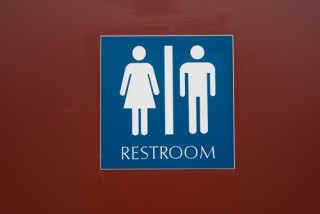
PITTSBURGH (AP) — A Pennsylvania school district will allow students to use restrooms that correspond to their “consistently and uniformly asserted gender identity” in settling a federal lawsuit brought last year by three transgender students.
Lambda Legal Defense and Education Fund announced the settlement Tuesday in Pittsburgh with the Pine-Richland School District in the city’s North Hills suburbs.
A federal judge in February blocked the Pine-Richland School District from enforcing interim rules that made bathroom use conditional upon a student’s biological gender only. U.S. District Judge Mark Hornak said then that the district had not demonstrated its policy advances an important governmental interest. Nor was there evidence that personal privacy was being threatened save for a complaint by a parent whose child reported a “boy in the girl’s bathroom” in October 2015, according to the judge.
Two students born anatomically male who now identify as female and one born anatomically female who identifies as male sued in October to overturn the policy.
The school district confirmed the settlement, which Lambda called “a victory for transgender students everywhere” and a “clear warning to school districts with anti-transgender bathroom policies.”
The district must also adopt policies “that respect transgender students’ gender identity with respect to student records, names, pronouns, and restrooms, among other aspects,” Lambda said in the statement announcing the settlement.
Schools spokeswoman Rachel Hatthorn said board members approved the settlement and related policies at a meeting July 17.
The transgender students, Juliet Evancho, Elissa Ridenour, and another identified only by the initials A.S., were all seniors and have since graduated.
“No one should have to go through what we went through and I’m so happy that transgender students at Pine-Richland High will no longer be discriminated against,” Elissa Ridenour said in a statement released by Lambda. “All of us had been using the restrooms that match who we are with no problems until some parents and outside groups complained. But, I’m glad the school district finally did the right thing.”
The district had instructed students to use restrooms corresponding to their anatomical or biological gender or one of the 10 unisex restrooms scattered throughout the school while the district researched passing a formal policy. The transgender students told the judge they were harassed by other students after the school board announced it was researching a permanent policy.
Attorneys for both sides previously acknowledged the district treated the students according to their stated gender identities in other respects, including referring to them by the pronouns they each prefer. One was elected a princess in the school’s homecoming court.
The language banning sex discrimination in schools is spelled out in Title IX, a 1972 federal law that still refers to gender in binary terms — male and female.
The U.S. Department of Education under President Barack Obama issued non-binding guidelines to school districts that Title IX was to be interpreted as applying to transgender students’ identities, too, but that guidance was rescinded by the department earlier this year under President Donald Trump.
The Title IX language is the subject of various federal court appeals and is expected to eventually wind up before the U.S. Supreme Court.
This article was written by Joe Mandak with the Associated Press.
[Image via Shutterstock]